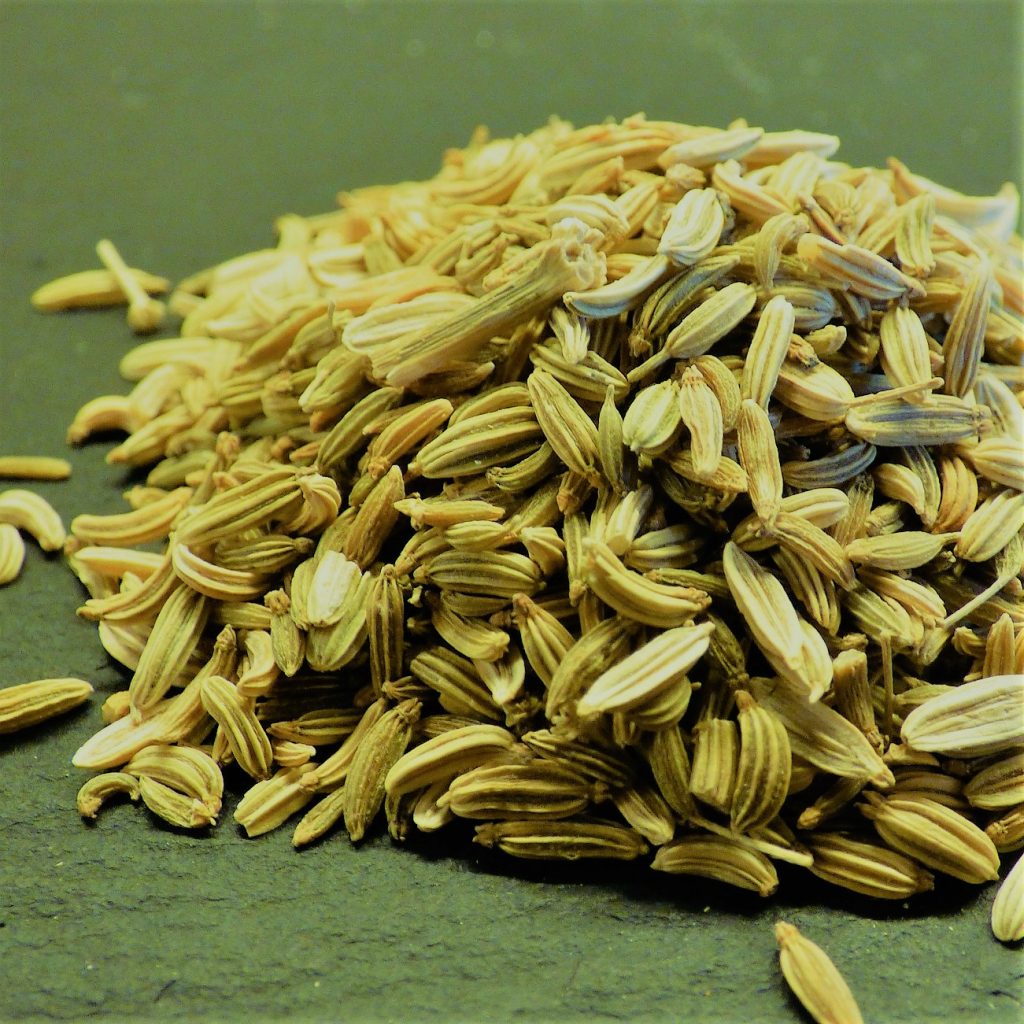Fennel seeds
Fennel seeds are harvested from the flowers of the plant and dried. They will usually be green to brown in oval shape. Like fennel bulbs, they have a sweet licorice flavor that can add a delicious flavor to dishes, and they go well with fish and pork. Each part of the plant has a culinary and restorative purpose. Plants or expanded bulbs are ready as food, while the bright leaves are arranged as pepper. Its fruits, again, have an anise flavor, which makes them good for various treatments and recipes.
Fennel seeds are similar in appearance to aniseed seeds and are different from the fennel plant. They contain various nutrients such as vitamin K, vitamin E, manganese, copper, zinc and phosphorus and are a good source of vitamin C.
Fennel seeds have a crispy exterior with a slightly sweet taste. It is also widely used as a mouthwash.
A serving of fennel seeds contains 1% of the RDA (Recommended Dietary Allowance) for Vitamin C, which works as an anti-cancer agent for your body, protecting your skin from any sun damage. , caused by smoke or pollution.
At the point when To Develop Fennel
Timing is significant while developing fennel outside, particularly assuming that you believe the plant should develop bulbs prior to shooting stunts bulb development. In spite of the fact that fennel is a strong spring vegetable plant, you would do well to establish it outside just once all risk of ice has passed in your zone. Be that as it may, you might begin seeds inside under develop lights a month prior to the last ice.
Where To Develop Fennel
Since fennel is an enduring vegetable, it keeps an eye on self-seed, returning many years. For this, you should pick a super durable spot for your fennel plant bed. It must be arranged in a space that gets entire day sun.
Nutrition Facts
According to the United States Department of Agriculture (USDA), 1 cup of sliced, raw fennel has the following nutritional benefits:
27 calories1g protein (2% Daily Value) fat: 0.2g 6g carbohydrates 2.7g fiber (11% Daily Value) 3g natural sugar
Vitamin C, a water-soluble vitamin essential for immune function, skin healing and collagen formation, is abundant in fresh fennel bulbs. Vitamin C also acts as an antioxidant in the body, preventing cell damage caused by free radicals.


Fennel seed benefits:
Helps control blood pressure
A review published in the Journal of Food Science, found that chewing fennel seeds helped to increase nitrites by filling the saliva, making it an amazing method to monitor the level of blood tension. Apart from this, fennel seeds are also an incredible source of potassium and since potassium is the building block of cells and water in the body, it helps to control your pulse rate and blood pressure. Reduce water retention:
Drinking fennel tea regularly helps to get rid of excess water as it acts as a diuretic. In addition, fennel seeds help to remove toxins and reduce the problem of urinary problems. It also has a diaphoretic effect that stimulates sweating.
Prevents cancer:
The fruit also contains an incredible free extremist research that helps fight oxidative stress and protect the body from various negative growth in the skin, stomach and breasts. Fennel seeds also have an incredibly strong chemomodulatory effect. In Ayurveda, fennel seeds are considered auspicious. They are used in various recipes in archaic India. The deepest secrets of quality can be found in the simplest design of our kitchen. We just have to reveal them. Fennel seeds reduce asthma symptoms:
Fennel seeds and their phytonutrients help clear sinuses. Sinus is the position of the cavity in the side of the nose that is excited. They make an amazing tea to help with bronchitis, clogging and hacking as they have promising properties.
According to Ayurveda:
Fennel seeds reduce each of the 3 Trodosha (Vata, Pita, Kapha). Fruits and vegetables affect the body. It is good to drink fennel seeds in hot summer, to reduce the heat in the body. The oil found in the fruit is carminative in nature, so it is used as a warming agent, especially in Ayurveda to calm the nerves and make the mind clear.
Rich in nutrients that protect health
According to research by BioMed Research International, fennel has long been used as an herbal remedy for a variety of conditions related to the digestive, endocrine, reproductive and respiratory systems and as a milk-promoting agent for nursing mothers. mad. Research shows that fennel contains health-protecting antioxidants as well as beneficial antimicrobial, antiviral, antifungal and anti-inflammatory compounds. One cup of raw fennel pieces is only 27 calories, with almost 3 grams of fiber. It contains 17% of the daily target of vitamin C that supports immunity and 10% of potassium that controls blood pressure, as well as small amounts of manganese, calcium, iron and B vitamins.
Improves bone health
Fennel is also a good source of calcium, which keeps your bones healthy. According to the Johns Hopkins Medicine Library, a lack of calcium can increase your chances of developing osteoporosis and bone loss.
Selection and storage
Fennel seeds are accessible all year in the business sectors either as seeds or handled ground structure. In the store, purchase entire fennel seeds rather than powder since regularly they might contain tainted zesty powders.
Store dry fennel seeds as you do if there should arise an occurrence of different seeds like caraway, dill, and so forth. Place entire seeds in a perfect air-seal holder and store them in a cool, moist free and dull spot. Ground and powdered fennel ought to be put away in the fridge in sealed shut holders and ought to be utilized sooner since it loses flavor rapidly because of the vanishing of its medicinal ointments.

